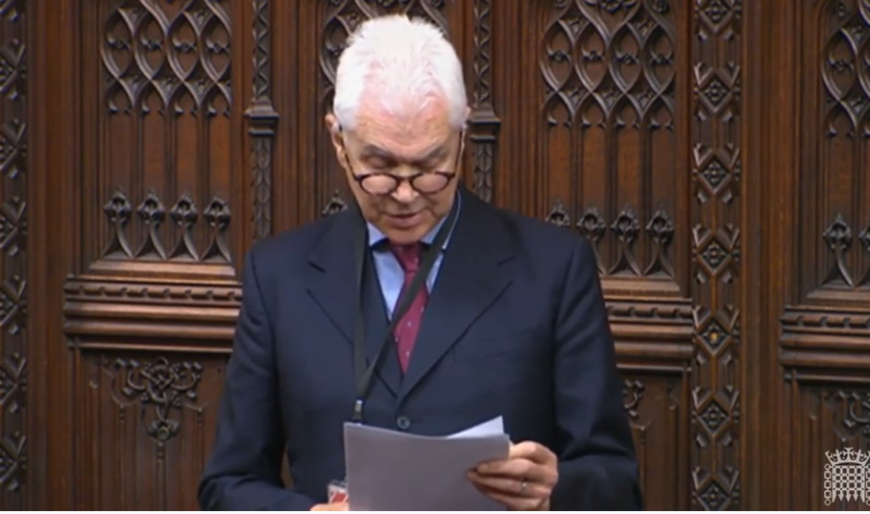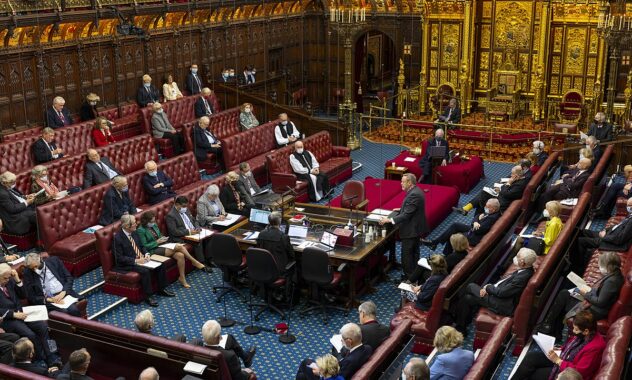Lord John Hendy: “This Bill contravenes the rule of law.”
The Chair of the Institute of Employment Rights (IER) speaks on the Minimum Service Levels Code of Practice in the House of Lords.

How right we were. Now, 10 months after the introduction of the Bill and four months after it became law, we find out, too late to debate or amend them, what the minimum service levels are to be. We now discover that the Act will remove many workers’ right to strike altogether. That means that three-quarters of the Border Force, 100% of ambulance drivers and call handlers, and signallers on priority routes are barred from striking between six in the morning and 10 at night. If the House had known those levels when we debated the Bill, amendments could have been debated, and some clauses might not have stood part. This irregular mode of legislating has cheated the House of those opportunities. I find that unacceptable.
My third point emphasises the second. The Act is being used as a device to amend the law on picketing, not by amending the statutory provisions that regulate picketing—Sections 220 and 220A of the 1992 Act—but by imposing on trade unions the duty to take “reasonable steps” to ensure that all members of a union who are identified in the work notice comply with the notice. This sidesteps the need for need for primary legislation; what the Delegated Powers Committee calls “disguised legislation” is deployed. The Code of Practice requires that picket supervisors must be instructed by the union
“to use reasonable endeavours to ensure that picketers avoid, so far as reasonably practicable, trying to persuade members who are identified on the work notice not to cross the picket line”.
In consequence, the law on picketing is changed. A failure, even a negligent failure, to so instruct even one picket supervisor—for example, at any one of the hundreds of picket lines in the recent RMT dispute—to use such “reasonable endeavours”, which is a phrase that is undefined in the Act, may expose the union to injunctions and damages claims in respect of the whole strike, and all strikers may lose automatic unfair dismissal protection. The omission of this picketing restriction from the Bill, to prevent parliamentary scrutiny and amendment, will be viewed by some as legislation by deception.
My fourth point is to draw the attention of the House to the fact that this Bill contravenes the rule of law. The right to strike is protected by Convention 87 of the International Labour Organization, ratified by the UK as long ago as 1948. The right to strike is not unlimited and, as has been said, the ILO has made it clear that minimum service levels are permissible in essential services, but subject only to certain conditions. I shall mention three.
First, the maintenance of minimum service levels in strikes is permissible only in services that are “essential”. Railways are not so considered by the ILO.
Secondly, the ILO requires dialogue between trade unions and employers to set the level of the minimum service. The Act, however, excludes dialogue between those parties in setting the level. The Minister alone does that.
Thirdly, once the level is set, the ILO requires the employer and the union to negotiate an agreement about how the service level will be fulfilled in the particular firm or service. In the event of a failure to agree, there must be an established independent adjudication process by the courts or agreed independent arbitrators. The Act fails in that respect as well.
Given that so many workers will lose the right to strike altogether, there is a fourth point to make. Where workers are barred legitimately from exercising the right to strike—for example, in the military—the ILO holds that, where collective bargaining fails to reach agreement, there must be access to speedy, binding, impartial and independent arbitration. The proposed non-binding conciliation that the Government have mentioned does not meet that threshold. As none of those conditions are met by the Act, there is a clear breach of ILO Convention 87. That is not the end of it, because Articles 387(2) and 399(5) of the trade and co-operation agreement require the UK not to weaken or reduce ILO fundamental standards below the levels in place at the end of the transition period.
I mention in passing that Article 6.4 of the European Social Charter, Article 8.1(d) of the International Covenant on Economic, Social and Cultural Rights, and Article 11 of the European Convention on Human Rights all protect the right to strike and are guided by the ILO jurisprudence on it, all of which were ratified by the UK.
For those reasons, among many others that my noble friends have and will articulate, I shall vote for the fatal amendment and, in case that fails, the regret amendment.”
Watch the full speech here:







